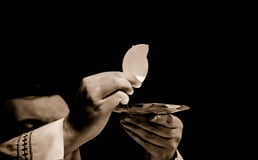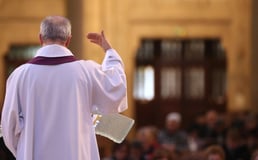Holy Eucharist
The Eucharist, or Communion, is both a sacrifice and a meal. We believe in the real presence of Jesus, who died for our sins. Holy Communion is the act of receiving the real presence of Jesus Christ's body and blood, transubstantiated from the bread and wine during Mass. As we receive Christ’s Body and Blood, we also are nourished spiritually and brought closer to God.

Sacrament of the Eucharist
What would make us worthy to receive Holy Communion? Simple answer: nothing. We are never worthy of so great a gift. But here’s the exciting part: God offers us this great sacrament freely. So why...
The Meaning of the Eucharist
As a little girl, when I prepared for my First Holy Communion I learned that Jesus was present in the bread and wine. But for many years, I would go to mass and go through the motions Sunday after...
5 Things to try if you find the homily boring
How is a well-meaning Catholic to keep from daydreaming or nodding off if the priest isn't dazzling? Chances are you’ve had to sit through at least one uninteresting homily in your life. Just like...Common Questions - Holy Eucharist
Receiving the Body, Blood, Soul and Divinity of Christ under the appearance of bread and wine.
No. Only properly disposed Catholics may receive Holy Communion. The word Communion can also be seen as “comm-union”, or in other words, “union with”. Receiving the Body and Blood of Jesus Christ signifies a proclamation of this belief, as well as expression of unity and belief in the Catholic Church and all that she teaches. If you are not a Catholic but feel drawn to the Catholic Church and the Eucharist, we invite you to visit our Becoming Catholic page.
Catholics receive the Body and Blood, Soul and Divinity of Jesus Christ every time they receive Holy Communion. We believe that Jesus is truly present in the consecrated species of bread and wine. Communion must then be received with the greatest reverence and worship of our Lord.
If possible, the Church recommends fasting for at least one hour prior to receiving the Eucharist. The Church also recommends taking part in the Sacrament of Reconciliation as often as possible, but at least once every year, to prepare our souls to receive Jesus.
If there are any mortal sins that are in the way of your relationship with Jesus, Confession removes the mortal sin to prepare your heart prior to receiving Jesus in the Eucharist.
Catholics are obliged to attend Holy Mass on all Sundays and holy days of obligation. The holy days of obligation are: December 25th (Christmas), January 1st (The Solemnity of Mary, Mother of God), 40 days after Easter Sunday (the Ascension of Jesus), August 15th (the Assumption of the Blessed Virgin Mary), November 1st (All Saints’ Day), and December 8th (Feast of the Immaculate Conception of The Blessed Virgin Mary). This obligation is meant to be seen in light of love and devotion to Jesus, responding to His invitation out of obedience, not mere duty.
If one misses Mass due to a serious illness or an unforeseen event, then he or she is encouraged to read the Mass readings for that week and reflect on the words of God as revealed in the Bible.